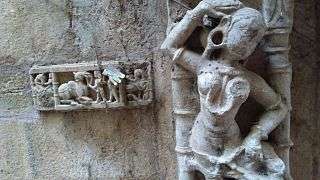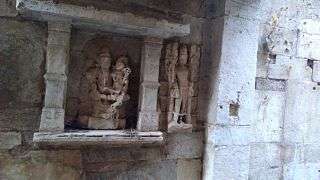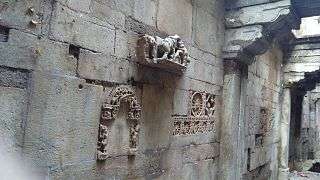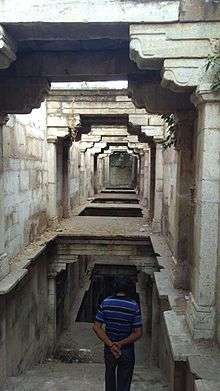Mithi Vav
Mithi Vav is a stepwell located in Palanpur town of Banaskantha district, Gujarat, India.[1][2] It is considered the only surviving monument of Parmara rule in the town. It was built around the 8th century. It is situated in the eastern part of the town. The five storey stepwell can be entered from the west. Based on its architectural style, it is believed that it is constructed in late medieval period but the sculptures embedded in the walls may belong to earlier period. The sculptures include that of Ganesha, Shiva, Apsaras, dancing figures, worshiping couples and floral or geometrical patterns. A worn out inscription found on one sculpture embedded in left wall cannot be read clearly, but the year Samvat 1320 (1263 AD) can made out.[3]
| Mithi Vav | |
|---|---|

| |
| General information | |
| Architectural style | Indian architecture |
| Town or city | Palanpur |
| Country | India |
| Coordinates | 24.174051°N 72.433099°E |
| Completed | 8th century |
| Technical details | |
| Floor count | Five storied stepwell |
| Design and construction | |
| Architect | Local |
| Designations | ASI State Protected Monument No. S-GJ-26 |
Gallery
 Idols embedded in walls
Idols embedded in walls View
View View
View Storeys viewed from above
Storeys viewed from above
gollark: <:Thonk:445016973798014987> <:Thonkdown:433149076721238016> <:Thonk:445016973798014987> <:Thonkdown:433149076721238016> <:Thonk:445016973798014987> <:Thonkdown:433149076721238016> <:Thonk:445016973798014987> <:Thonkdown:433149076721238016> <:Thonk:445016973798014987> <:Thonkdown:433149076721238016> <:Thonk:445016973798014987> <:Thonkdown:433149076721238016> <:Thonk:445016973798014987> <:Thonkdown:433149076721238016> <:Thonk:445016973798014987> <:Thonkdown:433149076721238016> <:Thonk:445016973798014987> <:Thonkdown:433149076721238016> <:Thonk:445016973798014987> <:Thonkdown:433149076721238016> <:Thonk:445016973798014987> <:Thonkdown:433149076721238016> <:Thonk:445016973798014987> <:Thonkdown:433149076721238016> <:Thonk:445016973798014987> <:Thonkdown:433149076721238016> <:Thonk:445016973798014987> <:Thonkdown:433149076721238016> <:Thonk:445016973798014987> <:Thonkdown:433149076721238016> <:Thonk:445016973798014987> <:Thonkdown:433149076721238016> <:Thonk:445016973798014987> <:Thonkdown:433149076721238016> <:Thonk:445016973798014987> <:Thonkdown:433149076721238016> <:Thonk:445016973798014987> <:Thonkdown:433149076721238016> <:Thonk:445016973798014987> <:Thonkdown:433149076721238016> <:Thonk:445016973798014987> <:Thonkdown:433149076721238016> <:Thonk:445016973798014987> <:Thonkdown:433149076721238016> <:Thonk:445016973798014987> <:Thonkdown:433149076721238016> <:Thonk:445016973798014987> <:Thonkdown:433149076721238016> <:Thonk:445016973798014987> <:Thonkdown:433149076721238016> <:Thonk:445016973798014987> <:Thonkdown:433149076721238016> <:Thonk:445016973798014987> <:Thonkdown:433149076721238016> <:Thonk:445016973798014987> <:Thonkdown:433149076721238016> <:Thonk:445016973798014987> <:Thonkdown:433149076721238016> <:Thonk:445016973798014987> <:Thonkdown:433149076721238016> <:Thonk:445016973798014987> <:Thonkdown:433149076721238016> <:Thonk:445016973798014987> <:Thonkdown:433149076721238016> <:Thonk:445016973798014987> <:Thonkdown:433149076721238016>
gollark: <:Thonk:445016973798014987> <:Thonkdown:433149076721238016> <:Thonk:445016973798014987> <:Thonkdown:433149076721238016> <:Thonk:445016973798014987> <:Thonkdown:433149076721238016> <:Thonk:445016973798014987> <:Thonkdown:433149076721238016> <:Thonk:445016973798014987> <:Thonkdown:433149076721238016> <:Thonk:445016973798014987> <:Thonkdown:433149076721238016> <:Thonk:445016973798014987> <:Thonkdown:433149076721238016> <:Thonk:445016973798014987> <:Thonkdown:433149076721238016> <:Thonk:445016973798014987> <:Thonkdown:433149076721238016> <:Thonk:445016973798014987> <:Thonkdown:433149076721238016> <:Thonk:445016973798014987> <:Thonkdown:433149076721238016> <:Thonk:445016973798014987> <:Thonkdown:433149076721238016> <:Thonk:445016973798014987> <:Thonkdown:433149076721238016> <:Thonk:445016973798014987> <:Thonkdown:433149076721238016> <:Thonk:445016973798014987> <:Thonkdown:433149076721238016> <:Thonk:445016973798014987> <:Thonkdown:433149076721238016> <:Thonk:445016973798014987> <:Thonkdown:433149076721238016> <:Thonk:445016973798014987> <:Thonkdown:433149076721238016> <:Thonk:445016973798014987> <:Thonkdown:433149076721238016> <:Thonk:445016973798014987> <:Thonkdown:433149076721238016> <:Thonk:445016973798014987> <:Thonkdown:433149076721238016> <:Thonk:445016973798014987> <:Thonkdown:433149076721238016> <:Thonk:445016973798014987> <:Thonkdown:433149076721238016> <:Thonk:445016973798014987> <:Thonkdown:433149076721238016> <:Thonk:445016973798014987> <:Thonkdown:433149076721238016> <:Thonk:445016973798014987> <:Thonkdown:433149076721238016> <:Thonk:445016973798014987> <:Thonkdown:433149076721238016> <:Thonk:445016973798014987> <:Thonkdown:433149076721238016> <:Thonk:445016973798014987> <:Thonkdown:433149076721238016> <:Thonk:445016973798014987> <:Thonkdown:433149076721238016> <:Thonk:445016973798014987> <:Thonkdown:433149076721238016> <:Thonk:445016973798014987> <:Thonkdown:433149076721238016> <:Thonk:445016973798014987> <:Thonkdown:433149076721238016>
gollark: <:Thonk:445016973798014987> <:Thonkdown:433149076721238016> <:Thonk:445016973798014987> <:Thonkdown:433149076721238016> <:Thonk:445016973798014987> <:Thonkdown:433149076721238016> <:Thonk:445016973798014987> <:Thonkdown:433149076721238016> <:Thonk:445016973798014987> <:Thonkdown:433149076721238016> <:Thonk:445016973798014987> <:Thonkdown:433149076721238016> <:Thonk:445016973798014987> <:Thonkdown:433149076721238016> <:Thonk:445016973798014987> <:Thonkdown:433149076721238016> <:Thonk:445016973798014987> <:Thonkdown:433149076721238016> <:Thonk:445016973798014987> <:Thonkdown:433149076721238016> <:Thonk:445016973798014987> <:Thonkdown:433149076721238016> <:Thonk:445016973798014987> <:Thonkdown:433149076721238016> <:Thonk:445016973798014987> <:Thonkdown:433149076721238016> <:Thonk:445016973798014987> <:Thonkdown:433149076721238016> <:Thonk:445016973798014987> <:Thonkdown:433149076721238016> <:Thonk:445016973798014987> <:Thonkdown:433149076721238016> <:Thonk:445016973798014987> <:Thonkdown:433149076721238016> <:Thonk:445016973798014987> <:Thonkdown:433149076721238016> <:Thonk:445016973798014987> <:Thonkdown:433149076721238016> <:Thonk:445016973798014987> <:Thonkdown:433149076721238016> <:Thonk:445016973798014987> <:Thonkdown:433149076721238016> <:Thonk:445016973798014987> <:Thonkdown:433149076721238016> <:Thonk:445016973798014987> <:Thonkdown:433149076721238016> <:Thonk:445016973798014987> <:Thonkdown:433149076721238016> <:Thonk:445016973798014987> <:Thonkdown:433149076721238016> <:Thonk:445016973798014987> <:Thonkdown:433149076721238016> <:Thonk:445016973798014987> <:Thonkdown:433149076721238016> <:Thonk:445016973798014987> <:Thonkdown:433149076721238016> <:Thonk:445016973798014987> <:Thonkdown:433149076721238016> <:Thonk:445016973798014987> <:Thonkdown:433149076721238016> <:Thonk:445016973798014987> <:Thonkdown:433149076721238016> <:Thonk:445016973798014987> <:Thonkdown:433149076721238016> <:Thonk:445016973798014987> <:Thonkdown:433149076721238016>
gollark: <:Thonk:445016973798014987> <:Thonkdown:433149076721238016> <:Thonk:445016973798014987> <:Thonkdown:433149076721238016> <:Thonk:445016973798014987> <:Thonkdown:433149076721238016> <:Thonk:445016973798014987> <:Thonkdown:433149076721238016> <:Thonk:445016973798014987> <:Thonkdown:433149076721238016> <:Thonk:445016973798014987> <:Thonkdown:433149076721238016> <:Thonk:445016973798014987> <:Thonkdown:433149076721238016> <:Thonk:445016973798014987> <:Thonkdown:433149076721238016> <:Thonk:445016973798014987> <:Thonkdown:433149076721238016> <:Thonk:445016973798014987> <:Thonkdown:433149076721238016> <:Thonk:445016973798014987> <:Thonkdown:433149076721238016> <:Thonk:445016973798014987> <:Thonkdown:433149076721238016> <:Thonk:445016973798014987> <:Thonkdown:433149076721238016> <:Thonk:445016973798014987> <:Thonkdown:433149076721238016> <:Thonk:445016973798014987> <:Thonkdown:433149076721238016> <:Thonk:445016973798014987> <:Thonkdown:433149076721238016> <:Thonk:445016973798014987> <:Thonkdown:433149076721238016> <:Thonk:445016973798014987> <:Thonkdown:433149076721238016> <:Thonk:445016973798014987> <:Thonkdown:433149076721238016> <:Thonk:445016973798014987> <:Thonkdown:433149076721238016> <:Thonk:445016973798014987> <:Thonkdown:433149076721238016> <:Thonk:445016973798014987> <:Thonkdown:433149076721238016> <:Thonk:445016973798014987> <:Thonkdown:433149076721238016> <:Thonk:445016973798014987> <:Thonkdown:433149076721238016> <:Thonk:445016973798014987> <:Thonkdown:433149076721238016> <:Thonk:445016973798014987> <:Thonkdown:433149076721238016> <:Thonk:445016973798014987> <:Thonkdown:433149076721238016> <:Thonk:445016973798014987> <:Thonkdown:433149076721238016> <:Thonk:445016973798014987> <:Thonkdown:433149076721238016> <:Thonk:445016973798014987> <:Thonkdown:433149076721238016> <:Thonk:445016973798014987> <:Thonkdown:433149076721238016> <:Thonk:445016973798014987> <:Thonkdown:433149076721238016> <:Thonk:445016973798014987> <:Thonkdown:433149076721238016>
gollark: <:Thonk:445016973798014987> <:Thonkdown:433149076721238016> <:Thonk:445016973798014987> <:Thonkdown:433149076721238016> <:Thonk:445016973798014987> <:Thonkdown:433149076721238016> <:Thonk:445016973798014987> <:Thonkdown:433149076721238016> <:Thonk:445016973798014987> <:Thonkdown:433149076721238016> <:Thonk:445016973798014987> <:Thonkdown:433149076721238016> <:Thonk:445016973798014987> <:Thonkdown:433149076721238016> <:Thonk:445016973798014987> <:Thonkdown:433149076721238016> <:Thonk:445016973798014987> <:Thonkdown:433149076721238016> <:Thonk:445016973798014987> <:Thonkdown:433149076721238016> <:Thonk:445016973798014987> <:Thonkdown:433149076721238016> <:Thonk:445016973798014987> <:Thonkdown:433149076721238016> <:Thonk:445016973798014987> <:Thonkdown:433149076721238016> <:Thonk:445016973798014987> <:Thonkdown:433149076721238016> <:Thonk:445016973798014987> <:Thonkdown:433149076721238016> <:Thonk:445016973798014987> <:Thonkdown:433149076721238016> <:Thonk:445016973798014987> <:Thonkdown:433149076721238016> <:Thonk:445016973798014987> <:Thonkdown:433149076721238016> <:Thonk:445016973798014987> <:Thonkdown:433149076721238016> <:Thonk:445016973798014987> <:Thonkdown:433149076721238016> <:Thonk:445016973798014987> <:Thonkdown:433149076721238016> <:Thonk:445016973798014987> <:Thonkdown:433149076721238016> <:Thonk:445016973798014987> <:Thonkdown:433149076721238016> <:Thonk:445016973798014987> <:Thonkdown:433149076721238016> <:Thonk:445016973798014987> <:Thonkdown:433149076721238016> <:Thonk:445016973798014987> <:Thonkdown:433149076721238016> <:Thonk:445016973798014987> <:Thonkdown:433149076721238016> <:Thonk:445016973798014987> <:Thonkdown:433149076721238016> <:Thonk:445016973798014987> <:Thonkdown:433149076721238016> <:Thonk:445016973798014987> <:Thonkdown:433149076721238016> <:Thonk:445016973798014987> <:Thonkdown:433149076721238016> <:Thonk:445016973798014987> <:Thonkdown:433149076721238016> <:Thonk:445016973798014987> <:Thonkdown:433149076721238016>
References
| Wikimedia Commons has media related to Mithi Vav. |
- "પાલનપુરમાં મીઠીવાવની સફાઈ કરાઈ" [Mithi Vav of Palanpur cleaned]. Divya Bhaskar (in Gujarati). 27 December 2013. Retrieved 4 March 2017.
- "Tourism in Banaskantha(Palanpur), Best Places in Banaskantha(Palanpur)". www.tourismguideindia.com. Retrieved 23 January 2017.
- Mehta, R. N. (31 March 1977). "III: Explorations in the Banaskantha District". Archaeology of the Banaskantha district, North Gujarat upto 1500 A D (Part 1) (Thesis). Department of Archaeology and Ancient History, Maharaja Sayajirao University of Baroda. pp. 77–78. hdl:10603/72152. Retrieved 7 March 2017.
This article is issued from Wikipedia. The text is licensed under Creative Commons - Attribution - Sharealike. Additional terms may apply for the media files.